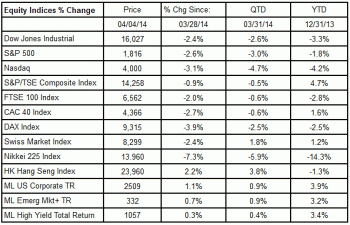John Davidson’s Economic Comments: Week ending April 11
The economic releases showed improvement in Europe and the U.S.. Nonetheless valuation concerns pulled equity prices lower. In a flight to safety bond yields fell across the globe. Credit spreads were wider for the riskier sectors. The U.S. dollar was weaker and commodity prices were higher on the week.
Perspective:
The economic indicators have shown improvement. The Euro-zone has weathered its sovereign debt storm; Greece was able to issue new bonds. The U.S. has weathered its winter vortex storms with but-a-pause in its recovery. Emerging countries have slowed their growth, but are still growing. So, why have the equity markets traded off so dramatically this quarter. It is not the "economy, stupid." It probably is valuation. While the economy slowed in the first quarter, corporate earnings and the corresponding guidance may have taken a bigger hit.
Factset projects that the S&P 500 will report a -1.6% year-over-year decline in earnings the first quarter. One caveat, this is the fourth time in the last 12 quarters that negative earnings were projected; yet, only one of those quarters concluded the quarter with negative reported earnings for the S&P 500 companies. Upside surprises have added 3.1 percentage points to initial projections; companies like to manage earnings in ways report upside surprises.
P/E ratios on the overall market are not badly out of line with the long term average of 15 times earnings. Birinyi Associates report that the S&P is selling at 17.61 times historic earnings, but 15.44 times projected earnings for the next 12 months. A year ago the S&P 500 was selling at at 18.6 multiple. The biggest recent stock market declines were in technology sector stocks. The Tech-heavy Nasdaq 100 was selling at 17.65 times (a discount to the S&P 500) a year ago; now, even after the recent sell-off, the Nasdaq is selling at an 20.65 multiple of past earnings and 18.01 times future earnings.
So, the fact that the economy is improving may not be sufficient to boost stocks if the valuations are high. Valuations can be improved by 1) falling stock prices, 2) rising earnings projections, or 3) upside surprises. On a personal note, the Davidson family is expecting an upside surprise in the birth of our first grandchild, Ella, who is due Wednesday.
Economic Releases:
In the U.S., Initial Claims for Unemployment benefits fell to 32,000 to 300,000 in the week of April 5. This was the largest one-week drop in more than a decade. The four-week average of Claims (blue in the chart) fell to 316,250. The chart shows that this measure was close to the pre-Great Recession level experienced in 2007. Continuing Claims (red in the chart), and which are reported on a one-week lag fell 62,000 to 2.774 million.
Other Economic Releases
In the U.S., Producer Price Index for Final Demand rose +0.5% in March; less food and energy PPI rose +0.6%; both measures were higher than the range of expectations, but the year-over-year increase in PPI was only 1.4%. The Reuters/University of Michigan Consumer Sentiment index for April rose more than two points to 82.6.
Industrial Production in Germany rose +0.4%; in France IP rose only +0.1% in February. In the UK IP for Input rose +0.9% while IP for Output rose +1.0%. The Bank of England met and, as expected, maintained rates at 0.50% and asset purchases at 375 billion pounds.
The Bank of Japan also met and left interest rates and asset purchases unchanged. China produced a $7.71 billion Merchandise Trade Surplus in March as imports fell more than exports; a deficit was expected; some believe that this was a sign of weakness in the Chinese economy.
Equities Markets:
A sell-off in technology and concerns about earnings led stocks lower again this week. Only the Hang Seng posted positive returns on the week. Most markets were down QTD and YTD after this second week of the sell-off.
Bond Markets:
Government Bond yields were lower across the globe this week. Investment grade corporate spreads were a basis point narrower, but emerging and high yield spreads were wider. Nonetheless, credit markets were higher on the week with the lower interest rates.
Currencies & Commodities:
The U.S. dollar fell against the other four currencies in the table. Note: the quoted values are not the way currencies are conventionally quoted. The table values are quoted in ways that the number is higher when the currency rises against the U.S. dollar; this is true for each closing value. One Euro buys $1.39. The number is higher when the Euro is stronger. The yen would normally be quoted at 101.6 using the normal currency conventions; it is a measure of 101.6 Yen per $1; the measure in the table $98.40 is the number of dollars 10,000 Yen would buy.
Energy and metals commodity prices rose on the week.
John W. Davidson, CFA, started writing these Comments more than a decade ago as a personal discipline when he was promoted from portfolio manager to chief investment officer and CEO.

Most recently, he was the president of PartnerRe Asset Management Corporation, responsible for the management of PartnerRe's invested assets, which grew from $4 billion to $12 billion during his tenure. After joining PartnerRe in the fall of 2001, he hired the staff, built the trading floor and created the infrastructure to manage both fixed income and equity assets internally. He retired from PartnerRe at the end of 2008 and moved to Maine, where he focused on board work.
He has more than 35 years of industry experience, including positions with investment management responsibility for separate institutional accounts, mutual funds, trusts and insurance assets. Prior to joining PartnerRe, he served as president and chief executive officer of two other investment management companies. For various companies he has held positions as chief investment officer, chief economist, head of fixed income and portfolio manager. As a portfolio manager, Davidson managed and traded U.S. Government Securities as well as futures and options on fixed income instruments.
His real world experience is backed by a strong academic foundation, which includes earning a Master of Business Administration in finance and a Master of Arts in mathematics from Boston College, as well as a Bachelor of Arts, cum laude, in economics from Amherst College. He holds the professional designation of chartered financial analyst.
His experiences and credentials have brought him to the public as a television commentator and conference speaker. In addition to his frequent past appearances on CNBC, CNNfn, Bloomberg TV and Yahoo FinanceVision, he appeared as a special guest on Wall $treet Week with Louis Rukeyser. Reuters, Bloomberg and other business press services have quoted his views on the market. He has taught CFA preparation programs, as well as other courses offered by the Stamford and Boston CFA Societies, and the National Graduate Trust Officers' School.
Davidson is a natural leader in both his professional and personal life, having developed those skills early in his career as a naval officer. He spent three years on active duty, which included a year on the rivers of Vietnam, and 24 years in the Naval Reserve, from which he retired as a captain in 1994.
Davidson is treasurer and board member of the Camden Conference. He is also on the investment committee of the Pen Bay Health Foundation. He serves as an independent trustee for mutual funds.
In his leisure time, he is an active sailor, tennis player and skier. With his wife, Barbara, he renovated a 100+-year-old home in Camden, where they enjoy spending time with their two golden retrievers and having visits from their five children. He can be reached at jwdbond@me.com.





























